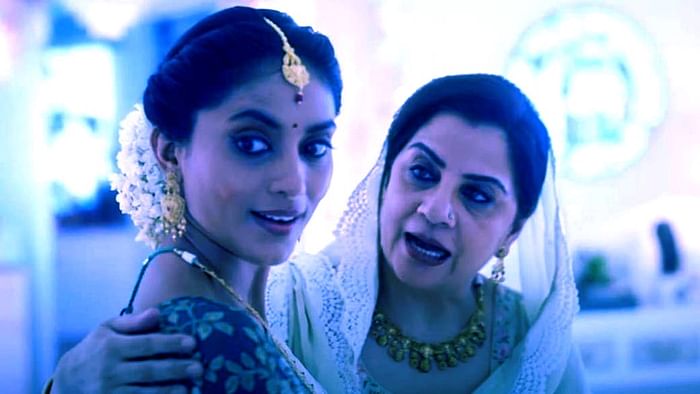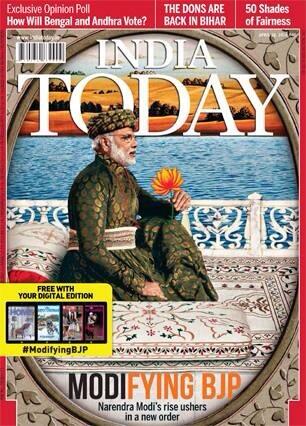15.10.20
Tanishq Ad and the Conscience Market
5.9.20
Indian Muslims Need Political Representation, Not Sham Secularism
19.7.15
Sunday ka Funda
This Eid, in India, belonged to two films that essentially celebrate Hindu mythology.
At a late night show of 'Baahubali' on the day that celebrates the conclusion of Ramzan, we watched a celebration of Lord Shiva. In the audience were quite a few Muslims in identifiable clothes — caps, hijabs, even burqa.
Despite its obvious mythology it does not alienate those who might not follow its precepts. In that sense, it is a truly secular movie, and I say this despite my aversion for standardised norms of secularism, or of the fads surrounding it as well as the slurs it invites by way of spelling. No, it is not sickular! (A review will follow later.)
***
I have not yet watched 'Bajrangi Bhaijaan', but from what I've read and heard it is also simplistic and guileless. Here, a Hanuman bhakt takes it upon himself to unite a little girl who is Muslim and Pakistani with her family.
This qawwali here is something I've heard from better artistes, but just that moment when the protagonist breaks down as the music soars conveys that faith — religious or otherwise — is essentially about flowing.
Eid Mubarak!
23.4.14
Shazia Ilmi's secularism
There is much, much more to call out Shazia Ilmi on. Not this:
“Don't be much secular. Muslims are too secular and they should become communal. They are not communal and do not vote for themselves. Arvind Kejriwal is ours. Muslims have remained secular for long...have voted for the Congress and helped them win. Don't be so secular and look at your house (community) this time. Other parties have their votebank intact and Muslim votes split. This is a controversial statement, but we should look at our own interest.”
Ilmi, the Aam Aadmi Party candidate from Ghaziabad was talking to some members of the community, including clerics. As is expected, there has been a reaction. Her own party members believe she should not have said it. She herself has clarified:
"I said it half sarcastically. Somebody was saying Muslims are very communal. I am saying Muslims are not communal, infact they are very secular. They need to be communal. This does not mean to incite hatred. They must think of themselves and must not be political slaves. What have the political parties done for Muslims in terms of political empowerment and representation in either government or private jobs, education... in terms of economic and political opportunities."
I figured the sarcasm bit out immediately and I am sure her audience did too. The only ones who did not are her party cadres, the opposition, and the media.
Their reason is obvious – to extend the show. For long the BJP has accused AAP of covertly working to benefit the Congress. But, then, why would they want the votes that would probably go to the party? Will AAP divide the votes against the BJP, and then see how it goes?
Besides that, there is Ilmi’s ‘be communal’ suggestion. Everybody is using the communal card or offering sops based on it, every group wants to protect its own. Why is this so surprising? I suppose wanting to build a Ram Mandir in the BJP manifesto is about the development module the party talks about.
If you look at Ilmi in this picture, she was not even trying to be non-communal. She was reaching out to a group of Muslims, and with her head covered was trying not to disrespect sentiments, although it is unlikely a non-Muslim would have tried to do so, and whether the people there might have been offended at all.
From some responses, it is rather amusing that those who have often been abusive towards the community and slandered its members for divisiveness now believe one newbie politician is spreading the message of communalism. Will they take back their insults, then, considering that Muslims are not communal? Interesting to see how they get trapped in their own arguments.
PS: Narendra Modi is trying hard to drop his communal stance. This magazine cover takes him right back to the days that his party wants erased. How will he build a temple with this image?!
© Farzana Versey
5.4.14
Are voters spoilt for choice or a dead-end?
They all look and act the same, with cosmetic differences, after you have sat down and taken stock. Why don’t the Congress, the Bharatiya Janata Party (BJP), and the Aam Aadmi Party (AAP) just form a coalition and be done with it? We can then have all their marketing ploys under one roof - secularism, development and no corruption. The rag-a-tag Third Front can work as an opposition. The Communists, Samajwadi Party, Bahujan Samaj Party and all the regional political groups can keep these three on their toes. This is if we ignore the fact that they all have enemies within.
The Congress topi has already become redundant. It used to be the Gandhi cap, which Gandhi never wore. The AAP cap tries hard to mimic the common man, especially Mumbai’s dabbawallas. It is quite a sight to see Bollywood stars and a banker who has declared a Mercedes among her assets don that cap saying ‘Aam Aadmi’. The BJP wears an invisible RSS cap. All leaders end up with some head-gear on their campaign trail to appear affable to the locals. One leader refused to wear a skull cap, though. But he even refused to wear spandex tights.
Unlike the United States of America we do not have clear Red and Blue states, but rainbow states, with rain and shine, slush and dryness. People are spoilt for choice and yet there does not seem to be one that a person who is not ‘naturally’ aligned would veer towards.
I have to keep repeating that these are general elections, not assembly polls, where a good candidate who fixes sewers, listens to citizens’ woes, attends kiddie parties, passes files for parks and sports grounds would work. Here you are directly casting a vote for a political party and the candidate is only a medium. S/he might visit your constituency occasionally, but the major decisions will be based on which party comes to power.
Then there is the debate about party manifestos. “Where is the manifesto?” I have been hearing the shrill cries in TV studios. How many people read the manifesto? Do not talk about only the few of us who manage to go through excerpts reproduced in the newspapers. We read the promises, are happy or disappointed with various offerings on paper. Do we ever put the parties on the mat to pledge that they will not change the basic values that they stand for and you voted for and ally with a party whose candidates they have publicly abused and put you through the same torture? How is this not crucial when it ought to form the backbone of who they are?
After much deliberation, I have come to the decision to support NOTA (none of the above). I have reservations even about this ‘nothing’, and had talked about it here. This is not a U-turn for me. It happens to be the only way in which I can assert that not making a choice is also a choice.
I had written the following:
Is NOTA an opinion? It sounds good on paper. But it won't have an impact.
The EC has already clarified that the candidate securing the highest number of votes would be declared elected even if the number of electors going for the NOTA option surpassed the votes polled by the electoral contestants.
There goes the non vote. NOTA is a wasted opinion, and chances are that those who have made this choice would publicly claim otherwise, if the party that comes to power looks cosmetically good. Will those who opted for NOTA come out and claim to be votaries of it?
In some ways, the rejection of all candidates is a rejection of the electoral process. If no one is good enough, then just boycott. 'None of the above' reeks of self-righteousness, rather than an opinion.
I admit I am being self-righteous. Personally, I can and may boycott the elections, but I have no right to urge or even suggest that others do the same. NOTA has got constitutional validity and I can proselytise about it, although I will not.
It brings us to the other question I raised: Will I sneak out of this after the results are announced and it could help me to stand by the victor? No. That is the reason I have put up the NOTA logo in the sidebar on this blog. I shall remove it only after the finale.
© Farzana Versey
--
Note to those who read me:
As you know, I try and engage with the comments. For the past few weeks I have been tardy, and it might continue for some time. Besides, where political stories are concerned I do not write anything I do not believe in, so it just ends up as reaffirming what I have already stated. I shall keep the comments box open, but will not respond to everything. A simple ‘thank you’ and ‘lovely’ is not my style. So, hope you understand and accept my thanks in advance for just reading and spending time thinking about it, thinking your own thoughts. I am sure your views would be of interest to others too, including me.
3.9.13
The call of the muezzin in court
It is such judgements that should make us have faith in the judiciary. Not only has it upheld secularism in Constitutional terms, it has also conveyed that politicians cannot pander to communal sentiments.
Imams and muezzins are most certainly not the responsibility of the government in India. The Calcutta High Court has made it clear that it is not the business of the state government to provide funds to the Wakf Board:
"It is well settled that the state cannot patronize or favour any particular religion. Secularism is part of the basic structure of our Constitution. The state, therefore, cannot identify itself with or favour any particular religion. Imams and/or muezzins are individuals of the Muslim community and attached with mosques. The decision to provide honorarium to them cannot serve the general interest of the community as a whole."
However, I do not see why the judges had to add that it had “unnecessarily created tension among different religious communities which should be avoided in a secular state”. The BJP was one of the petitioners against the Rs. 2500 and Rs. 1000 stipend to the imams and muezzins. What if the Mamata Banerjee government decided to also provide for sadhus in temples – would the bench think of this as equitable and secular because it would then favour others, too?
At the centre of the discord is “public purpose”, with the state believing it should be given the privilege. The court reiterated:
"The concept of public purpose cannot be contrary to the pronounced constitutional value of secularism. If today the government is allowed to spend out of the public exchequer by granting honorarium to the religious leaders of a particular religious community to the exclusion of similar treatment to other religious communities, such a governmental action being unconstitutional, cannot be said to be for public purpose."
While I completely agree that those attached to mosques should be given an honorarium only by the authorities running such institutions and the government owes it nothing – in fact, the community should shun such gestures by the political establishment – I do believe the judges were trying to be politically-correct.
This ought not to become a precedent against minorities and scheduled castes and tribes where ‘secularism’ will be brought in to argue against certain kinds of reservations that have to do with right to opportunity that has been often denied to many.
Let us not forget that Mamata Banerjee is no friend of tribals or even some minorities. Recall the villages that were thrown open for corporate ventures. It is important for the leaders of communities to be alert. Most politicians will only pander to what are explicitly religious places, because they want the sops to be visible from miles away. The ordinary Muslim, Hindu, Christian, Sikh, Dalit does not know, or care about, who runs the show.
It is this ordinary daily wage earner who needs such ‘gestures’ the most. Secularism must not come in the way of that. For, as we know only too well, money is the most secular, and it is in the hands of a few who probably spend more time building places of worship or donating to it. Some even work as backroom boys to prop up political parties with a religious agenda.
©Farzana Versey
9.5.13
Vande Mataram can survive without our singing it...
This has become news. A BSP MP walked out of Parliament when Vande Mataram was being played at the end of the dud budget session. No one seems interested in what came out of the proceedings, but the fact that Shafiqur Rahman Barq insulted the national song.
He was even interviewed for it. He told CNN-IBN: "I won't apologise to anyone. I respect the National Anthem, not the national song Vande Mataram. Vande Mataram is an ode to motherland. Muslims like me bend only before Allah, not before any other god."
We'll get to him in a bit, but the speaker of the house Meira Kumar responded rather quickly: "One honourable member walked out when Vande Mataram was being played. I take very serious view of this. I would want to know why this was done. This should never happen again."
Has it happened before? How often?
The BJP had a nice token Muslim Shahnawaz Hussain to speak up: "Members have no right to insult the National Song especially when they have taken oath. The Speaker has taken the right move by naming the MP. He has insulted Parliament."
Say he has insulted the national song, not Parliament, for the oath does not specify what you will sing. Does the oath specify whether watching pornographic clips in the assembly is an insult to the House, and the oath taken by members?
Unfortunately, this has turned into a communal debate. I do take exception to those who take up the Muslim cause and say most Muslims are nice folks, unlike Burq. This is not about terrorism or some crime, and the community can do without this granting of certificates for good behaviour. And for those who are concerned about Muslims and ready with their “Go to Pakistan" 'anthem', let me remind them that the song that registers most even for them is “Saare jahaan se achhaa" written by Sir Mohammed Iqbal, one of the main architects of the idea of Pakistan. Enjoy!
I reproduce here some views expressed in 2006 - read it as past tense:
How many Indians know the Vande Mataram song? Are they aware it was written by Bankim Chandra Chatterjee as a cry against British oppression? Does knowing it make them better patriots?
On September 7 (2006) school children in Uttar Pradesh will have to compulsorily sing the ‘national song’ to commemorate its centenary; government papers have been passed to that effect. Forget the communal colour of the controversy for a moment. What should really bother us is the dictatorial nature of such a directive.
We are making children into pawns of our divisive mindsets.
The Muslims are cribbing that bowing before anyone but Allah is un-Islamic. These clerics ought to know that people regularly bow at tombstones in dargahs. Don’t many Muslim organisations carry around pictures of religious leaders and even rebel political figures in a crass mockery of obeisance? Where is their Islam, then?
On the other hand, we have the BJP’s token symbol Mukhtar Abbas Naqvi saying, “Those who oppose our national song should better leave the country. Their opposition is a reflection of their separatist mindset.”
At a sensitive time when almost every Muslim is a target of some suspicion, the last thing anyone ought to be talking about is separatist mindsets, especially if it hinges on the singing of a song. If people of the North East refuse to sing or do not know the Vande Mataram, will they be asked to leave the country? Would you tell this to some Christian or Parsi or even a Hindu?
Our motherland has survived this last century without off-key singing. If you wish to pay tribute to a national song, then do it with dignity. Play it in the background and everyone will stand silently and respect it. Those who wish to hum along could do so. But do not force false ideas of patriotism on the minds of vulnerable children.
By doing so you are ironically conveying that we are not even a democracy.
© Farzana Versey
Postscript:
1. Rabindranath Tagore rejected Vande Mataram as the national song:
"The core of Vande Mataram is a hymn to goddess Durga: this is so plain that there can be no debate about it. Of course Bankimchandra does show Durga to be inseparably united with Bengal in the end, but no Mussulman [Muslim] can be expected patriotically to worship the ten-handed deity as 'Swadesh' [the nation]. This year many of the special [Durga] Puja numbers of our magazines have quoted verses from Vande Mataram—proof that the editors take the song to be a hymn to Durga. The novel Anandamath is a work of literature, and so the song is appropriate in it. But Parliament is a place of union for all religious groups, and there the song cannot be appropriate. When Bengali Mussulmans show signs of stubborn fanaticism, we regard these as intolerable. When we too copy them and make unreasonable demands, it will be self-defeating."
http://en.wikipedia.org/wiki/Vande_Mataram#Adoption_as_.22national_song.22
2. Besides the Muslim 'problem', the song has had objections from other communities:
http://en.wikipedia.org/wiki/Vande_Mataram#Sikh_view





